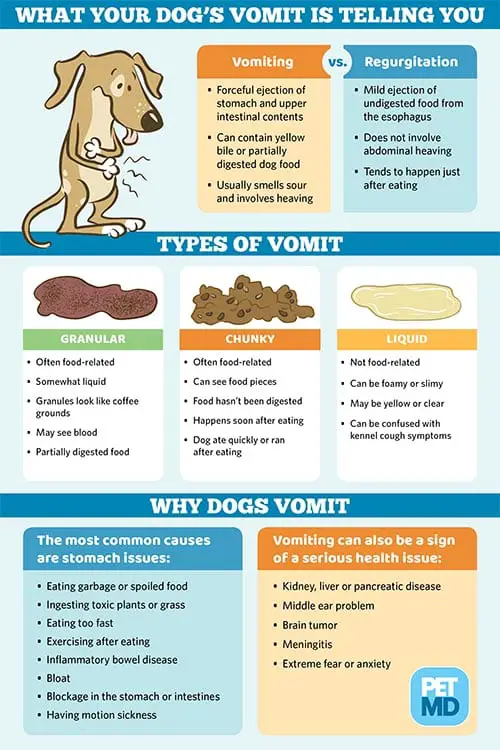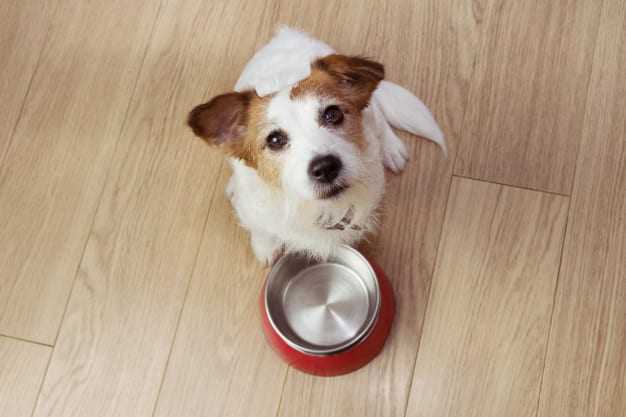We love our dogs, and we enjoy seeing them play and have fun. They are considered members of the family and rightly so.
People cannot imagine living without their favorite pets. However, pets can sometimes get sick too.
They may have an issue that is bothering them, but they cannot tell us what it is. That is why you need to pay attention to all the signs they are giving us.
If you see your dog Dog Vomiting White Foam, you should not immediately panic.
Yes, it can look bad and disturbing, likely meaning that your dog is suffering from something, but the chances are high that your dog will be just fine soon.
If your dog is vomiting white foam and you don’t know why it is, you should know the following.

If the vomit is pale and looks like bubbly saliva or white foam, usually that is because there is an excess of air in your dog’s stomach.
This is not something serious, and it usually goes away very soon.
It happens because there is nothing else left in your dog’s stomach to be purged, so your dog starts throwing up white foam.
The foam is a mix of gastric juices and saliva, and it is perfectly normal for dogs to try to get rid of them.
- How to Make DIY Dog Toys
- Top 10 Most Common Dog Health Problems
- 10 Amazing Things about Pomeranian Dogs
What Causes The Dog White Foam?
One of the main causes is distress. Your dog has probably accumulated a lot of gas in the stomach.
When the dog has indigestion, and there is nothing inside his stomach left to be expelled, it will start throwing up the foam.
Causes for distress can be different. It can come from a heart stroke, ingesting some toxin, or eating some stomach irritants such as grass.
It can also come from an infection caused by bacteria or by eating something spicy, fatty, or sugary.

Other Causes for Throwing Up Dog White Foam
- Indigestion is a common cause. Like humans, dogs may sometimes try to get rid of some irritating substances in their stomachs by throwing it up. Perhaps the dog has eaten too much or has consumed lots of water after exercising . If your dog is not vomiting consistently and the white foam is thrown up from time to time, the chances are high that they are experiencing typical indigestion.
- Bloat is another cause of throwing up white foam. It usually occurs in senior dogs, but it can happen to any dog breed regardless of the age. Bloat happens when the dog’s stomach is filled with fluid, food, or gas. Then its stomach expands so the dog must throw up the excess material. Besides throwing up white foam, dogs can also experience excessive drooling or coughing.
- Acid reflux or reflux gastritis happens when the dog throws up white foam before eating. That is because his gastrointestinal tract is irritated by acid, usually when the dog’s stomach is empty. To prevent your dog from building up acid in his stomach, a good idea is to reduce its food portions while increasing the number of meals throughout the day.
- Kidney Disease can also lead to dog vomiting white foam. If your dog is frequently urinating, feels lethargic, and is sometimes disoriented, then the chances are high that the dog has some kidney problems. If you notice such symptoms, you should take your dog to the vet for proper examination and prevention of future problems.
- Kennel cough happens when your dog has spent time with other dogs in a closed environment. This cough is contagious, affecting the respiratory organs of the dog. However, this infection is not very serious, and it usually goes away after a week or so. You can easily diagnose kennel cough if you notice symptoms like honking cough that triggers white foam coming out of their mouth. Other common symptoms are loss of appetite, sneezing, runny nose, and lethargy.
- Pancreatitis is another cause for dog’s vomiting white foam. Dogs that suffer from this condition throw up their food after eating. They also experience pain in the abdomen, diarrhea, and dehydration.
- Parvovirus is a virus that affects small dogs, i.e., puppies. If puppies have this virus, they will start vomiting white foam, and can also experience fever, bloody diarrhea, and lethargy.
Meaning Of Different Colors of Dog Vomit
 Image Credits – PetMD
Image Credits – PetMD
The color of dog vomit is usually influenced by the food that the dog has eaten.
If you notice that the vomit’s color is not because of something your dog has ingested, then you should pay close attention to it.
Sometimes it is hard to determine the color of vomit, but some clues can help you determine more easily.
If your dog vomit is yellowish, then that is usually a common sign of bile. An upset stomach usually causes white vomit.
It can also mean that your dog has eaten some foreign material, grass, or something similar.
Black vomit is rare in dogs, but it can happen. This is usually a benign sign when your dog has dug up and eaten some dirt or soil.
However, it can also be a cause of a serious problem. On rare occasions, it can indicate that the dog has swallowed a toxin or it has a stomach ulcer.
A brown vomit with a strong odor can come if your dog has eaten something that he was not supposed to, such as his feces or other dog’s feces.
It can also indicate that there is some kind of block in the dog’s intestines.
Red dog vomit can be alarming because it usually has something to do with blood.
Sometimes dogs can vomit blood, but this is not a very serious issue unless it happens very often.
If there is some irritation on the stomach lining or if the dog has ingested something foreign, the chances are high that it will throw up some blood as well.
Often, dogs will start vomiting without blood, but when the stomach irritation increases, some blood can show up.
As mentioned, it is not something to panic about if it happens just once, or the amount of blood is very small.

Finally, green dog vomit is usually caused by a couple of things that are not that serious or cause a big concern.
Most likely, the dog has ingested some plant material when playing outside.
They can eat some grass, which then affects their stomach and cause the dog to vomit.
If you see that the white foam has some grass present, your dog has likely eaten a plant.
Green vomit can also happen if there is a bile present.
Bile is made of different components coming up from the liver cells and stored in the dog’s gallbladder.
Right after the dog eats his meal, the gallbladder releases the bile into the small intestine to help with the absorption of nutrients.
Often it happens for some bile to reflux into the dog’s stomach, which then causes vomiting.
Treatment of Vomiting in Dogs

First of all, you should never panic when your dog vomits. The first thing to do is to identify the main cause of the vomiting of your dog.
Is it a chronic disease, an allergy to foods, or some other condition? There are many possibilities, and you should consult a veterinarian if you are not sure.
If your veterinarian has determined that your dog is perfectly healthy and there are no other signs of concern, you should not worry.
However, you should always take your dog to the vet’s office for regular check-ups.
On some occasions, the vet can prescribe some medications for the dog or suggest some other strategies for dealing with the problem.
When to See the Veterinarian If Your Dog Vomits White Foam
If your dog is an old dog, a small puppy, or had some serious medical problems before, you should make an appointment with the vet as soon as you see your dog vomiting white foam.
The vet will be able to correctly determine the condition of the dog, and it can also treat it for dehydration that comes after vomiting large amounts of white foam.
If your dog looks healthy but occasionally throws up some white foam – you should not worry.
It is probably regular indigestion that will go away quickly.
However, if the episodes of vomiting white foam happen more frequently and your dog does not look as healthy as it was, then see your vet as soon as possible.

Sometimes the gastrointestinal issues of your dog may be a sign of some serious problem.
That is why your vet should be the first to call if you are concerned about something regarding your dog.
Veterinarians can often give some good advice on the phone, so you will get a clearer idea about the problem with your dog.
Keep in mind that in a large number of cases, vomiting of white foam is harmless.
It is usually caused by eating something strange, such as grass or plant.
If your dog has an upset stomach, then the best thing to do is not to give them food for several hours until his gut calms down.
When your dog appears ready to eat, give him just a small portion of food that can be digested easily, such as boiled rice or chicken.
If he eats the meal and does not have problems with vomiting white foam afterward, you can rest assured that your dog is perfectly fine.
Situations are more serious when the dog starts shaking, coughing, has trouble breathing, or experiences lethargy.
In any case, medical professionals can suggest which course of action should be taken to keep your dog healthy.
Hopefully, you will find this information helpful if you notice your dog vomiting white foam.

Make sure that you check everything first and then contact your veterinarian about what exactly you should do.
Remember that it is usually nothing that serious, but getting your dog examined can eliminate your worries or fears.
Dogs are curious animals, and they often eat things they are not supposed to.
Try to train them on what they should avoid and what they should eat.
When they get into a routine, they are unlikely to do something they are not supposed to.
Observe your dog constantly, spend time with them, and your dog will avoid health issues.
Some dogs are more resistant to health problems than others, but almost all dogs have experienced vomiting white foam before.
Be aware that this is something that often happens, so do not be immediately afraid that there is something wrong with your dog.
Stay informed at all times, contact your vet regularly and take your dog on regular examinations.
That way, your dog will remain healthy and will live a long and happy life.





